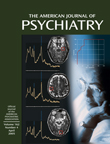5-Methoxy-N,N-Diisopropyltryptamine-Induced Flashbacks
Mr. A, a 35-year-old Japanese man without a previous psychiatric history, was seen with perceptual disturbances. One month before his evaluation, he had stopped using 5-MeO-DIPT because of a so-called bad trip—anxiety, palpitations, auditory oversensitiveness, and visual distortion—after six or seven times using between 15 mg and 30 mg of 5-MeO-DIPT over 5 months. He was bisexual and had used the drug to enhance intercourse with a male partner. A few days before his evaluation, after the announcement of his father’s diagnosis of a brain tumor, his 5-MeO-DIPT-induced phenomena of a “bad trip” returned, although he had not taken 5-MeO-DIPT.There was no evidence of CNS infection or organic brain disease. Amphetamine was not detected in Mr. A’s urine. He was not clinically depressed. Schizophrenia-like symptoms, such as delusions or auditory hallucinations, were not present. He was given oral risperidone, 1 mg/day. Within 3 days, his perceptual disturbances remarkably decreased, and 7 days later, they had almost completely disappeared. Given his clinical features and history of drug ingestion, we made a diagnosis of hallucinogen-persisting perception disorder induced by 5-MeO-DIPT. Mr. A was discharged 1 month later. Although this medication was maintained for 4 months and then terminated, he has had no relapse.
References
Information & Authors
Information
Published In
History
Authors
Metrics & Citations
Metrics
Citations
Export Citations
If you have the appropriate software installed, you can download article citation data to the citation manager of your choice. Simply select your manager software from the list below and click Download.
For more information or tips please see 'Downloading to a citation manager' in the Help menu.
View Options
View options
PDF/EPUB
View PDF/EPUBGet Access
Login options
Already a subscriber? Access your subscription through your login credentials or your institution for full access to this article.
Personal login Institutional Login Open Athens loginNot a subscriber?
PsychiatryOnline subscription options offer access to the DSM-5-TR® library, books, journals, CME, and patient resources. This all-in-one virtual library provides psychiatrists and mental health professionals with key resources for diagnosis, treatment, research, and professional development.
Need more help? PsychiatryOnline Customer Service may be reached by emailing [email protected] or by calling 800-368-5777 (in the U.S.) or 703-907-7322 (outside the U.S.).

